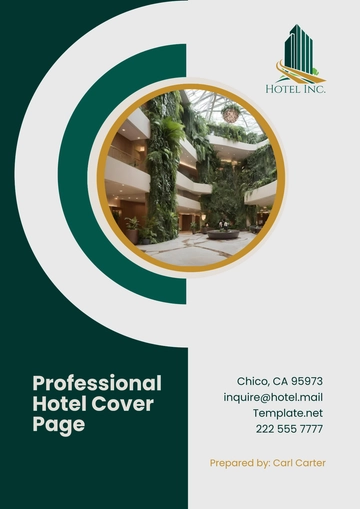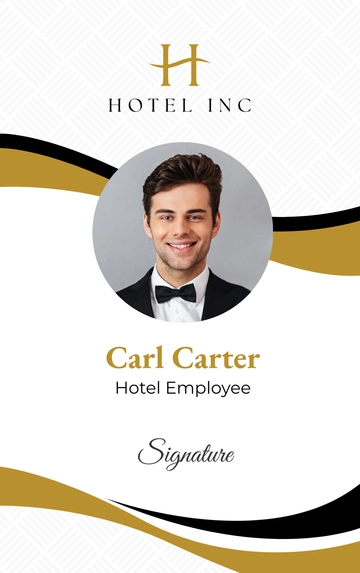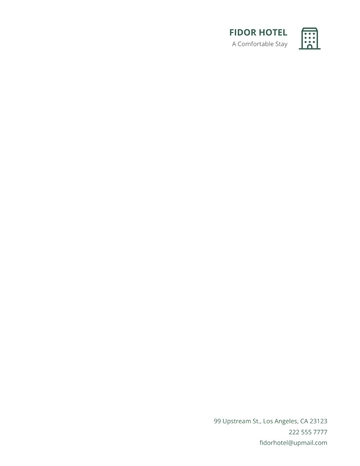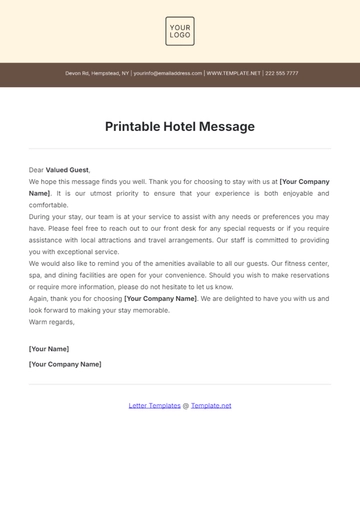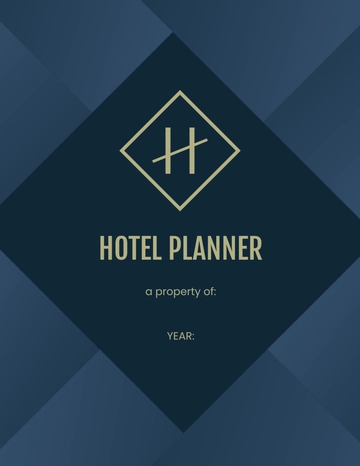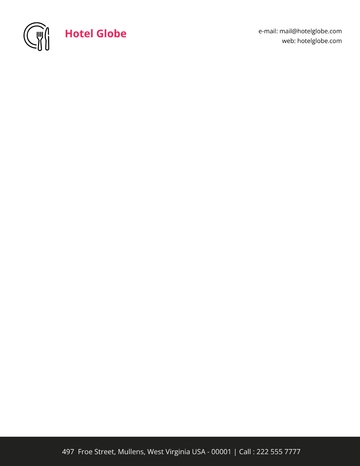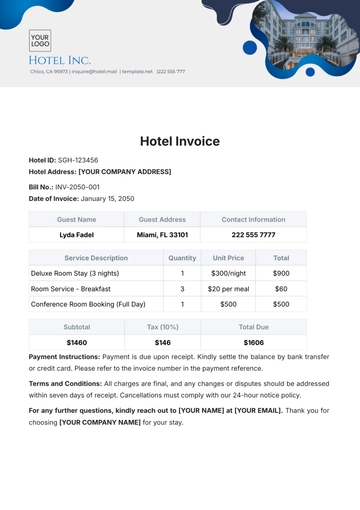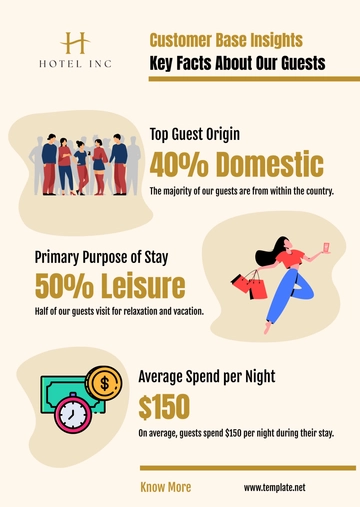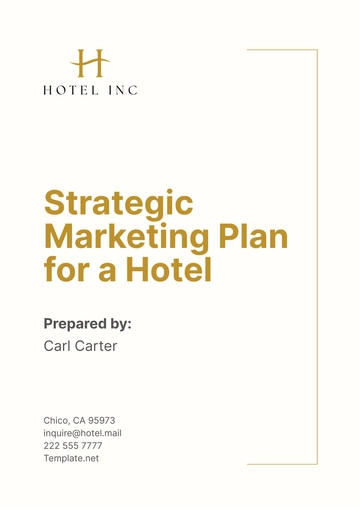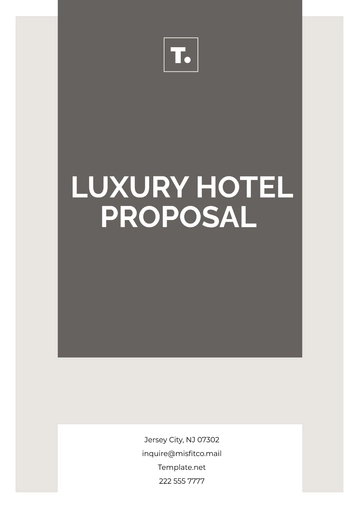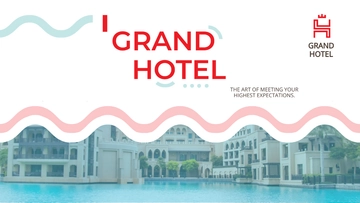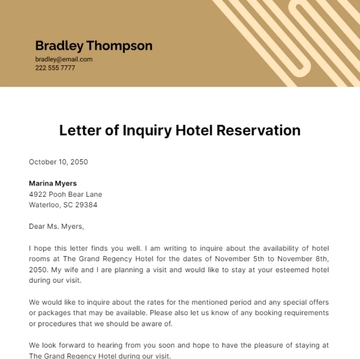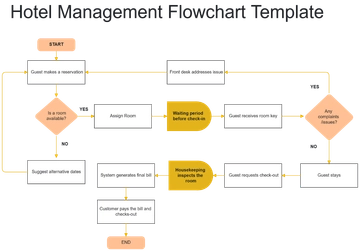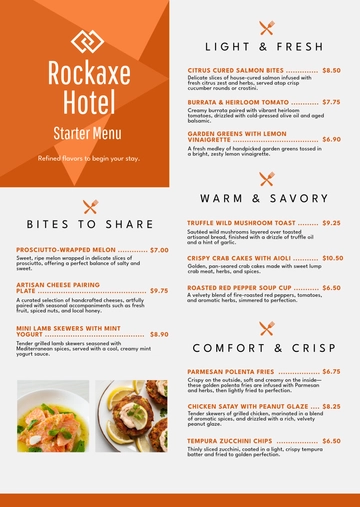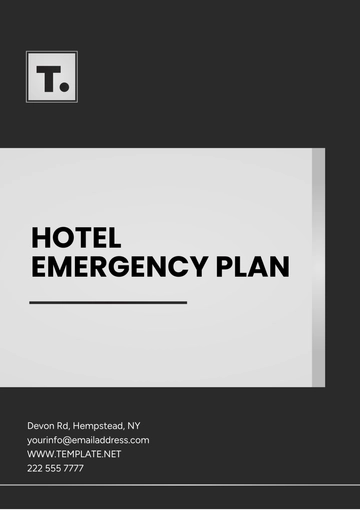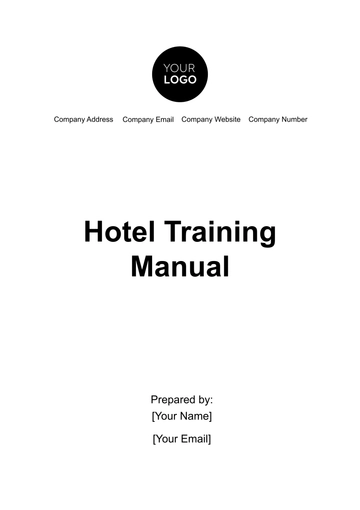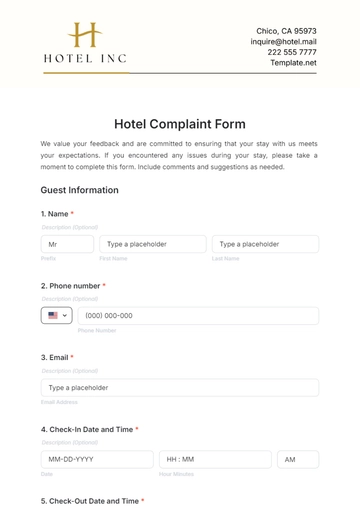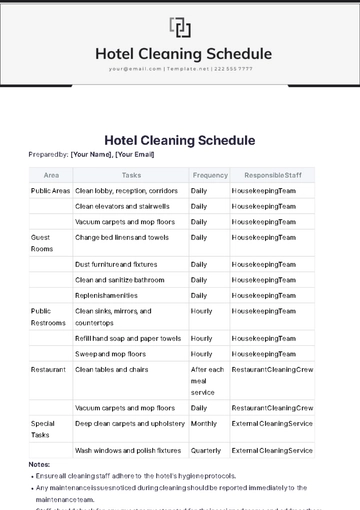Free Hotel Management Policy
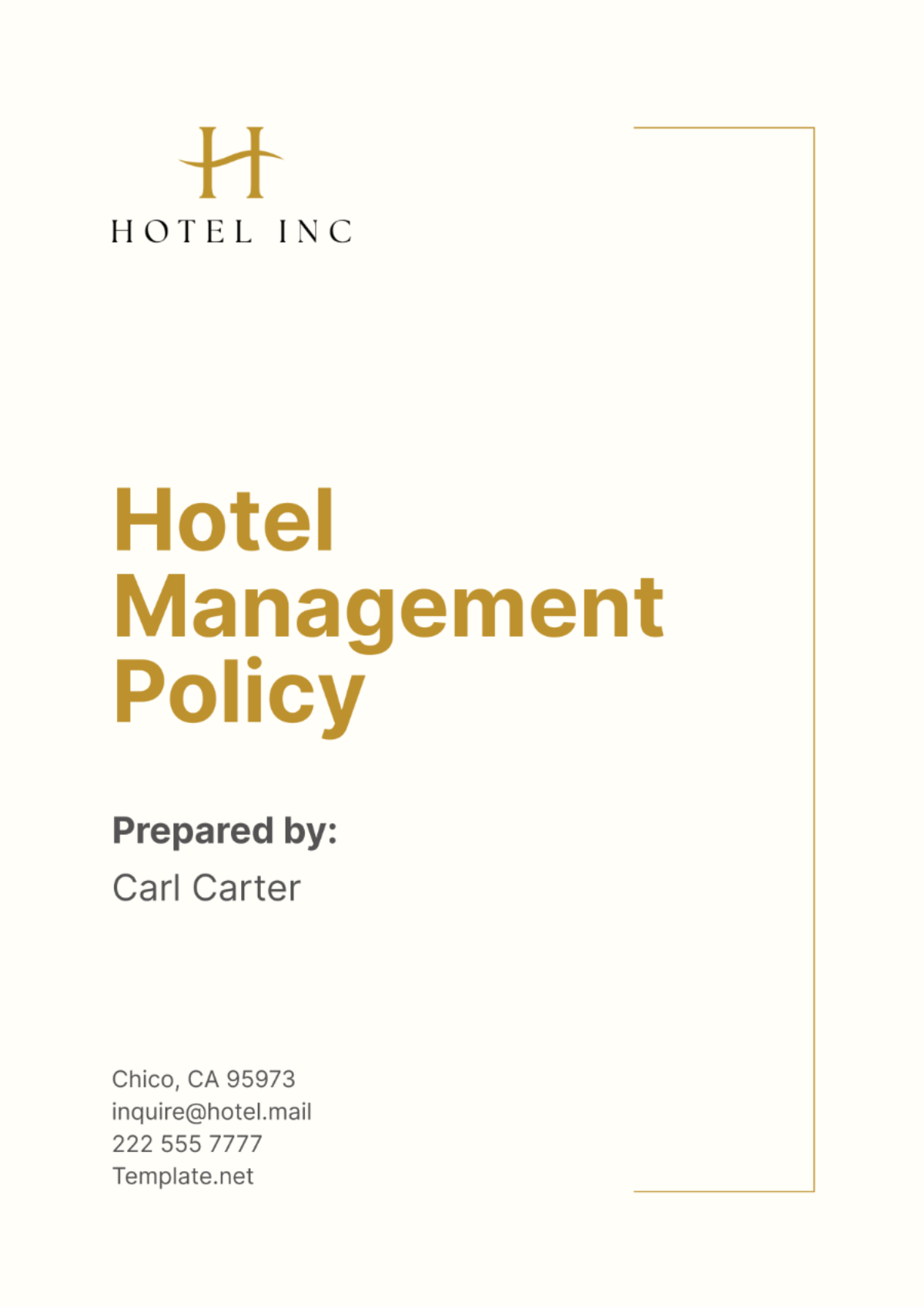
Effective Date: [Date]
I. Introduction
Welcome to the Hotel Management Policy of [Your Company Name]. This document provides clear guidelines and protocols to ensure efficient and ethical management within our establishment. All staff and management are expected to adhere to these policies to maintain high standards of service and operational excellence. By following this policy, we aim to offer an exceptional experience for our guests while fostering a supportive and professional environment for our team.
II. Organizational Structure and Responsibilities
A well-defined organizational structure is crucial for the smooth functioning of our hotel. Each role within our establishment carries specific responsibilities to ensure seamless operations and guest satisfaction.
General Manager
Responsibilities:
Oversees all hotel operations and ensures compliance with policies.
Develops and implements strategic plans to improve hotel performance.
Maintains relationships with key stakeholders, including guests, staff, and vendors.
Front Desk Manager
Responsibilities:
Manages the reception area, guest services, and bookings.
Ensures a smooth check-in and check-out process for guests.
Handles guest inquiries and resolves complaints promptly.
Housekeeping Manager
Responsibilities:
Ensures cleanliness and maintenance of guest rooms and public areas.
Supervises housekeeping staff and schedules shifts.
Conducts regular inspections to maintain high cleanliness standards.
Food & Beverage (F&B) Manager
Responsibilities:
Oversees food and beverage services, including restaurants and events.
Manages inventory and ensures quality of food and beverages.
Coordinates with chefs and kitchen staff to maintain menu standards.
Maintenance Manager
Responsibilities:
Manages the upkeep of the hotel’s physical infrastructure.
Schedules and supervises maintenance and repair work.
Ensures compliance with safety and health regulations.
HR Manager
Responsibilities:
Handles recruitment, training, and employee relations.
Develops and implements HR policies and procedures.
Manages payroll, benefits, and employee performance evaluations.
III. Decision-Making Process
Effective decision-making is essential for the smooth operation of our hotel. This section outlines the process for making significant decisions within the organization, ensuring that all perspectives are considered and the best possible outcomes are achieved.
Consult Relevant Department Managers
To ensure that decisions are well-informed and consider all relevant factors, input and insights must be gathered from the managers of the departments involved. This collaborative approach ensures that the unique expertise and perspectives of each department are considered, leading to more comprehensive and effective decision-making.
Action Steps:
Schedule regular meetings with department managers to discuss ongoing and upcoming decisions.
Encourage open dialogue and active participation from all managers.
Document feedback and suggestions from these consultations for reference in the decision-making process.
General Manager Holds Final Decision-Making Authority
While input from various departments is crucial, the General Manager retains the final decision-making authority. This centralized approach ensures that decisions align with the overall strategic vision and objectives of the hotel.
Action Steps:
Review all input and feedback from department managers.
Consider the broader implications of each decision, including potential impacts on other departments and overall hotel operations.
Make informed decisions that balance departmental needs with the hotel's strategic goals.
Document All Major Decisions
Keeping a detailed record of all major decisions is essential for transparency, accountability, and future reference. Documentation helps track the rationale behind decisions and facilitates consistent communication across the organization.
Action Steps:
Maintain a decision log that includes the date, decision details, rationale, and involved parties.
Communicate documented decisions to all relevant staff promptly.
Store decision records securely and ensure they are accessible for future reference.
Encourage Team Meetings
Regular team meetings provide a platform for gathering diverse perspectives and fostering collaborative decision-making. These meetings help build a cohesive team environment and ensure that all voices are heard.
Action Steps:
Schedule regular team meetings to discuss important issues and upcoming decisions.
Foster an inclusive atmosphere where all team members feel comfortable sharing their opinions.
Use these meetings to identify potential challenges and brainstorm solutions collaboratively.
Utilize Data and Guest Feedback
Data-driven decision-making and guest feedback are critical components of effective management. Basing decisions on accurate data and guest insights helps improve services and operations, ensuring that the hotel meets and exceeds guest expectations.
Action Steps:
Collect and analyze relevant data, including financial reports, occupancy rates, and customer satisfaction surveys.
Incorporate guest feedback into decision-making processes to address areas for improvement.
Continuously monitor key performance indicators to inform future decisions.
IV. Ethical Standards and Conduct
Maintaining high ethical standards is paramount to our operations. This section outlines the conduct expected from all employees and management to uphold the hotel's reputation and ensure a positive work environment.
Maintain Integrity and Transparency
Honesty and transparency are fundamental to building trust with guests, employees, and stakeholders. All operations should be conducted with the highest level of integrity.
Action Steps:
Ensure all communications, both internal and external, are truthful and clear.
Encourage employees to report any unethical behavior without fear of retribution.
Implement regular audits to ensure compliance with ethical standards.
Avoid Any Form of Discrimination or Harassment
Promoting a respectful and inclusive workplace is essential for a positive working environment. Discrimination or harassment of any kind will not be tolerated.
Action Steps:
Provide regular training on diversity, inclusion, and harassment prevention.
Establish clear procedures for reporting and addressing discrimination or harassment incidents.
Foster a culture of respect and inclusion through team-building activities and open dialogue.
Respect Guest Privacy and Confidentiality
Guest information must be handled with the utmost confidentiality to maintain trust and comply with legal requirements.
Action Steps:
Implement strict policies for handling and storing guest information.
Train staff on data privacy and confidentiality protocols.
Use secure systems to manage and protect guest data.
Adhere to Local, State, and Federal Regulations
Compliance with all applicable laws and regulations is essential for lawful and ethical operations.
Action Steps:
Stay informed about relevant local, state, and federal laws.
Regularly review and update policies to ensure compliance.
Conduct periodic compliance audits and address any identified issues promptly.
Promote Fairness and Equality Within the Team
Fair treatment of all employees is crucial for maintaining morale and productivity. Ensuring equal opportunities and addressing any biases is a key responsibility of management.
Action Steps:
Develop and implement fair recruitment, promotion, and compensation practices.
Conduct regular reviews to ensure equal opportunities for all employees.
Address any complaints of unfair treatment promptly and fairly.
V. Communication and Information Management
Effective communication and proper information management are crucial for operational efficiency and guest satisfaction. This section outlines the policies and practices for managing communication and information within the hotel.
Utilize Designated Communication Channels
Using designated communication channels ensures that information is disseminated accurately and efficiently.
Action Steps:
Establish official communication channels such as emails, meetings, and bulletin boards.
Ensure all employees are aware of and use these channels for official communications.
Monitor and manage these channels to maintain clear and organized communication.
Maintain Clear and Timely Communication with Guests and Staff
Clear and timely communication is essential for meeting the needs of both guests and staff.
Action Steps:
Train staff on effective communication skills.
Ensure all guest inquiries and requests are addressed promptly.
Provide regular updates to staff on important matters affecting their roles.
Ensure All Official Documents Are Properly Stored and Accessible
Proper document management is critical for maintaining organizational efficiency and compliance.
Action Steps:
Implement a document management system for storing and organizing official documents.
Ensure that all documents are properly labeled and easily retrievable.
Train staff on document management best practices.
Use Secure Systems to Protect Sensitive Information
Protecting sensitive information is crucial for maintaining guest trust and complying with legal requirements.
Action Steps:
Implement robust cybersecurity measures to protect data.
Regularly update and review security protocols.
Train staff on the importance of data security and confidentiality.
Encourage Feedback and Open Dialogue Within the Team
Encouraging feedback and open dialogue helps identify areas for improvement and fosters a positive work environment.
Action Steps:
Create channels for employees to provide feedback anonymously if desired.
Regularly solicit feedback through surveys and meetings.
Act on feedback received to improve operations and employee satisfaction.
VI. Risk Management
Identifying and mitigating risks is essential to safeguarding our hotel's operations and reputation. This section outlines the strategies for managing risks effectively.
Conduct Regular Risk Assessments
Regular risk assessments help identify potential issues before they become significant problems.
Action Steps:
Schedule periodic risk assessments for all aspects of the hotel’s operations.
Involve relevant department managers in the assessment process.
Document identified risks and develop action plans to address them.
Develop and Implement Contingency Plans
Having contingency plans in place ensures that the hotel can respond effectively to emergencies and unexpected events.
Action Steps:
Develop contingency plans for various types of emergencies, including natural disasters, power outages, and security breaches.
Regularly review and update contingency plans to ensure their effectiveness.
Conduct drills and training sessions to ensure staff are familiar with emergency procedures.
Ensure Comprehensive Insurance Coverage
Comprehensive insurance coverage provides financial protection against various risks.
Action Steps:
Review insurance policies regularly to ensure they provide adequate coverage.
Work with insurance providers to update policies as needed.
Ensure all staff are aware of the hotel’s insurance coverage and how to report claims.
Train Staff on Emergency Procedures and Safety Protocols
Proper training ensures that staff can respond effectively in emergencies.
Action Steps:
Develop and implement a training program for emergency procedures and safety protocols.
Conduct regular training sessions and drills to reinforce knowledge and skills.
Review and update training materials regularly to ensure they remain current.
Monitor and Mitigate Financial Risks
Prudent financial management helps avoid financial instability and ensures the hotel’s long-term viability.
Action Steps:
Regularly review financial reports and key performance indicators.
Implement financial controls to prevent fraud and manage expenses.
Develop a financial risk management plan to address potential financial challenges.
VII. Resource Allocation and Budgeting
Efficient allocation of resources and sound budgeting practices are key to the financial health of our hotel.
Departmental Budget Allocation
The following table outlines the budget allocation for each department within the hotel for the fiscal year:
Department | Budget Allocation (USD) |
|---|---|
Front Desk | $100,000 |
Housekeeping | $80,000 |
F&B | $150,000 |
Maintenance | $120,000 |
HR | $60,000 |
Front Desk: Allocation for staff salaries, training, and operational costs.
Housekeeping: Funds for cleaning supplies, equipment, and staff wages.
F&B: Budget for food and beverage supplies, kitchen equipment, and staff.
Maintenance: Costs for repairs, equipment maintenance, and contractor services.
HR: Expenses related to recruitment, training, and employee welfare.
VIII. Conflict Resolution
Effective conflict resolution is vital for maintaining a harmonious workplace and ensuring guest satisfaction.
Identify the conflict and the parties involved: Clearly define the issue and the individuals involved.
Facilitate a constructive dialogue between the parties: Encourage open and respectful communication.
Listen to all perspectives and gather all relevant information: Ensure all parties have the opportunity to share their views.
Propose mutually beneficial solutions and compromises: Aim for resolutions that satisfy all parties involved.
Implement the agreed-upon solution and monitor its effectiveness: Ensure the resolution is put into practice and track its success.
Document the process and outcome for future reference: Keep a record of the conflict and how it was resolved for future guidance.
IX. Conclusion
By adhering to this Hotel Management Policy, [Your Company Name] commits to providing exceptional service to our guests and a supportive work environment for our employees. Continuous improvement and adherence to ethical standards remain our top priority. We encourage all team members to familiarize themselves with this policy and uphold its principles in their daily operations. Together, we will achieve excellence in hospitality and uphold our reputation as a premier hotel.
Approved by:
[Your Name]
[Your Title]
[Date]
Contact Information:
General Manager: [General Manager's Name] - [General Manager's Number]
Front Desk Manager: [Front Desk Manager's Name] - [Front Desk Manager's Number]
Housekeeping Manager: [Housekeeping Manager's Name] - [Housekeeping Manager's Number]
F&B Manager: [F&B Manager's Name] - [F&B Manager's Number]
Maintenance Manager: [Maintenance Manager's Name] - [Maintenance Manager's Number]
HR Manager: [HR Manager's Name] - [HR Manager's Number]
- 100% Customizable, free editor
- Access 1 Million+ Templates, photo’s & graphics
- Download or share as a template
- Click and replace photos, graphics, text, backgrounds
- Resize, crop, AI write & more
- Access advanced editor
Efficiently manage your hotel operations with Template.net's Hotel Management Policy Template. Designed to streamline administrative processes, this template offers comprehensive guidelines and procedures for staff and management. Editable and customizable through our AI editor tool, tailor it to fit your hotel's unique requirements. Elevate your management practices with ease, only at Template.net.

